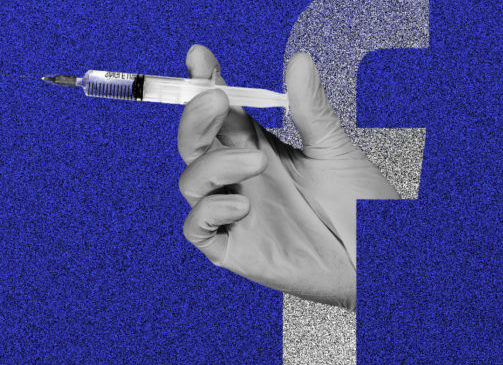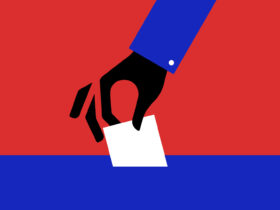LOS ANGELES — In late July, Senators Amy Klobuchar (D-MN) and Ben Ray Luján (D-NM) introduced a bill to hold Facebook accountable for the spread of health misinformation on its platform. The Health Misinformation Act would strip the liability shield that large tech and social media firms rely on for immunity from lawsuits under Section 230 of the Communications Decency Act.
Under the proposal, the Department of Health and Human Services would define what content is classified as health misinformation. Specifically, the bill would alter Section 230’s language to revoke immunity in cases where health misinformation is created or developed through the platform and is amplified through an algorithm. While the law would not apply to neutral mechanisms like social media feeds that rank posts in chronological order, the law does apply to platforms that rely on algorithms to determine what content they show users in their feed — which is the case for nearly all major Internet platforms. The bill would also only apply in declared national public health crises.
“Features that are built into technology platforms have contributed to the spread of misinformation and disinformation, with social media platforms incentivizing individuals to share content to get likes, comments, and other positive signals of engagement, which rewards engagement rather than accuracy,” the bill reads.
The HMA would attempt to hold platforms accountable for conspiracy theories, health misinformation and crisis disinformation. This marks a sharp turn from the status quo, where Facebook and other companies are legally protected from the inordinate amounts of user-created content that their platforms host.
The bill comes at a critical time amid the coronavirus pandemic. Throughout the last year and a half, the world has been grappling with a battle on two fronts. While COVID-19 ravages populations, health systems and global economies, the misinformation crisis has also been equally as devastating.
“For far too long, online platforms have not done enough to protect the health of Americans,” said Klobuchar, who chairs the Senate Subcommittee on Competition Policy, Antitrust and Consumer Rights. “These are some of the biggest, richest companies in the world and they must do more to prevent the spread of deadline vaccine misinformation.”
Experts say the world is currently experiencing an “infodemic,” a term coined by journalist and political scientist David Rothkopf as a blend of “information” and “epidemic.” In 2003, Rothkopf wrote in a Washington Post column that the SARS epidemic was “the story of not one epidemic but two, and the second epidemic, the one that… largely escaped the headlines… ha[d]implications that [were]far greater than the disease itself.”
Rothkopf wrote that the then-public health crisis facing the world was harder to contain and control due to the severe crises of information and trust as a result of increased reliance on the Internet and social media. But the media and information landscape of 2021 is vastly different from the environment Rothkopf wrote of in 2003 — and the situation has only worsened.
With the production and administration of COVID-19 vaccines in different stages around the world, vaccine misinformation and conspiracies have dominated the current digital space. The Centers for Disease Control and Prevention and the World Health Organization have made the spread of misinformation a priority issue. And while misinformation can come from anywhere — from Russian-aligned disinformation campaigns to cable news networks — research shows that just 12 people are responsible for the majority of misleading claims about vaccines. The bill mentions these misinformation “influencers.”
“The ‘Disinformation Dozen’ produce 65% of the shares of anti-vaccine misinformation on social media platforms,” said Imran Ahmed, chief executive officer of the Center for Countering Digital Hate.
However, while misinformation continues to rattle public confidence in vaccines, Klobuchar and Luján’s bill may be no more than a hollow gesture.
The HMA relies on the existence of underlying laws that ban the distribution of health misinformation. The catch? No such laws exist. Even if the proposed bill were to become law, it would still be legally permissible for individuals to post health misinformation. As a result, it’s unclear what a lawsuit against Facebook or another tech firm for misinformation would even look like.
While the bill does not make it illegal to distribute material within that classification, it instead proposes “that if an underlying law makes it illegal to distribute health misinformation, then a lawsuit… could proceed by alleging violation of that law.” To clarify, Facebook and other tech firms would have previously had immunity from similar lawsuits under Section 230.
The bill itself has no teeth, but it was not necessarily made to. Instead, the proposal is largely seen as a policy campaign to pressure Facebook and other companies into doing more to quell misinformation and strip “conspiracy influencers” of their platforms.
In fact, the bill purposefully avoids going directly after social media companies. If the bill made it illegal for the distribution or promotion of public health misinformation during a public health crisis — like a pandemic — then it would have entered tricky constitutional territory concerning the First Amendment.
Giving a government agency the authority to determine the line between truth and lies, and attach legal consequences to that distinction is worrying to many. And even if that decision-making power was not a cause for concern, the line between “legitimate scientific disagreements about the effects of vaccines and conducting a willful disinformation campaign” is hazy. If the bill were to contain a provision giving it teeth and creating a new, direct cause of action for lawsuits, many experts doubt that it would pass “strict scrutiny,” a constitutional test to ensure that this restriction of speech was to further a “compelling governmental interest.”
Even without this provision, staunch defenders of Section 230, “a prized legal shield for social media companies,” are still wary of any new carveouts to the law. Earlier this year, Democratic senators proposed the first major Section 230 reform of the Biden era, but critics said that bills targeting Section 230 are often well-intentioned but fear unintended consequences on free expression, online speech and the open Internet. Free speech advocates warn that allowing tech companies to have a tighter grip on controlling what users are allowed to post has damning implications.
This is also not the first time that Congress has tried to repeal parts of Section 230. In 2020, Congress introduced the EARN IT Act, which would take away immunity from tech companies if they did not address child pornography on their platforms. The bill is still in Congress. And earlier this year, two Democratic senators introduced the Protecting Americans from Dangerous Algorithms Act, which would remove Section 230 protections in cases where algorithms amplified posts that involved international terrorism or interfered with civil liberties.
Though the carveout may not be the strongest solution to the infodemic, the response from the social media companies might be promising for these efforts. Facebook responded to the bill’s effort to go after big tech’s legal immunity, saying that it supports reforming Section 230.
“We believe clarification on the difficult and urgent questions about health-related misinformation would be helpful and look forward to working with Congress and the industry as we consider options for reform,” said Kevin Martin, a vice president of public policy at Facebook.
But what’s missing from the MHA is bipartisan support. Though concern over the accountability of tech giants in promoting health misinformation is found on both sides of the aisle, the newly introduced bill is shrouded in political polarization. The bill takes aim at vaccine misinformation, politically isolating some Republican lawmakers who have been less vocal on the issue than their Democrat counterparts.
But without buy-in from Republicans, the bill will likely struggle to gain ground.







